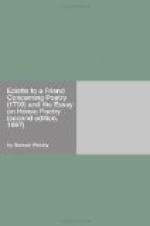When the Poet has proceeded thus far, and as Bossu calls it, dress’d his Project, he’s next to search in History or receiv’d Fable, for some Hero, whose Name he may borrow for his Work, and to whom he may suit his Persons. These are Bossu’s Notions, and, indeed, very agreeable to Aristotle, who says, that Persons and Actions in this sort of Poetry must be feign’d, allegorical, and universal.
This is the Platform they lay; and let’s now see if we can discover the Reasons whereon they found these Rules, being so unanimous for Fable rather than true History, as the Matter of an Heroic Poem; and, if I mistake not, these are some of the principal.
1. Because they had observ’d the best Models of Heroic Poems were laid after this manner; the greatest part of the Action both in Homer and Virgil being pure Fable. Homer beginning, and all the rest following his Steps.
2. Because no single Hero, or true History, which the Ancients knew was sufficient, without Fable, to furnish Matter for an Epic Poem. History, says Aristotle, treats of particular Things as they really are; Poetry, as they ought to be; and therefore he prefers Poetry as the more grave and more instructive; the Poets being forc’d to follow the same Methods with their Kindred-Art, that of the Painters, and gather a great many Beauties together, out of ’em all, to steal one Venus.
3. A third Reason may be, because, supposing they should have found some one Example from whence to enforce strongly any particular Point of Morality, yet it would have miss’d those other Characters of Epic, most of its Agreeableness, and all its Power to raise Admiration. A chast Historian must not go about to amuse his Reader with Machines; and a Poet that would imitate him, must have been forc’d to thin his Stage accordingly, and disband all his glorious Train of Gods and Godesses, which composes all that’s admirable in his Work; according to that of Boileau; Chaque Virtue devient une divlnitie.




